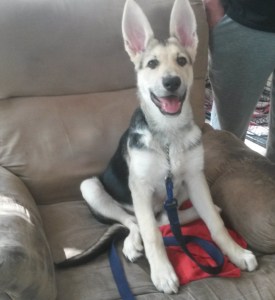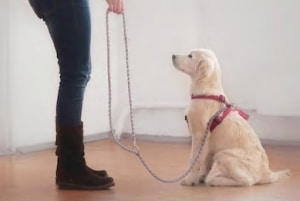When Your Puppy Seems to Have Forgotten It’s Training
What Do You Do?
When Your Puppy Seems to Have Forgotten It’s Training
What do you do when your puppy seems to have forgotten it’s training?
Training your dog is not just a one-time thing that you do after you bring it home for the first time. Training is a lifetime commitment and it needs to be done every day of the dog’s life.
Puppies typically learn very quickly. A puppies brain is like a little sponge. For this reason the period from 8 weeks to 6 months is the best time to teach all of the basic skills that it will need during its life. It is also a great time because the puppy hasn’t picked up any bad habits yet!
As they grow, a lot of puppies go through a period of life that is like puberty in humans. During this time your puppy may seem to be regressing or even appearing to be forgetting its previous training. If or when this seems to be happening to your puppy it’s important to consider all of the possible causes and then come up with a solution that will get the training back on track.
Why is My Puppy Regressing in its Training?
There are several reasons why they appear to be regressing in their training.
1. Confusion can be one possible cause. Consistency in training is essential to successful learning. Ask yourself, “Am I using the same verbal and/or non-verbal signals?” If not, go back to the beginning and start over.


2. It could be caused by an underlying medical issue. If you suspect this might be the problem, check with your vet to make sure your pup has a clean bill of health before you continue any training.
3. The training might be moving too quickly. Solid training requires consistent repetition and reinforcement. When you add new commands or behaviors you still need to continue to repeat the previous training every day. Just like young children, if you move past the previous training and don’t continue to do “refresher” training, the puppy may forget the lessons in a short time.
4. Not training enough or skipping sessions can also be the problem. Learned behaviors need to become part of your puppy’s daily routine. If you don’t reinforce the previous training everyday, your puppy could forget the training and bad habits may begin to creep in. This is the biggest reason I teach owners to work in short sessions throughout the day instead of only doing training once a day or 3-4 times per week.
5. Physical Development Issues can also play a big part in training regression. Puppies go through several development stages in their young lives. Their brain chemistry and behavior patterns change during these stages and it sometimes effects learning. This is often referred to as “growth spurts” and these “spurts” sometimes produce new or temporary behavior issues. These often manifest themselves as a lack of concentration, stubbornness or even rebellion. This can be very frustrating for the humans. But rest assured that, as Abraham Lincoln once said: “This Too Shall Pass.”
The thing to remember when your puppy seems to have forgotten it’s training is not to take it personally. Keep your composure, take a deep breath and use plenty of patience. There are a few work-a-rounds. You can still reinforce your previous training during this time, but you will need to change your methods a bit. In order to get the puppy interested in learning during this time it is often best to incorporate the training into your play sessions. Another way is to turn the learning into a game that they want to play!
6. Fear is another possible reason that your dog may appear to be regressing.
If your usually happy-go-lucky puppy suddenly starts to exhibit signs of fear, anxiety or stress it could be going through what behaviorists call a “fear period.” This fear period can happen in a puppy’s life from 12 to 16 weeks of age and then again around the age of 6 months to 12 months. These periods are often directly tied to hormonal and other physical changes.
When a puppy is 12 to 16 weeks old the introduction of new situations and circumstances is incredibly important. Introducing the pup to new things and then rewarding it for a positive reaction will help condition it and build a positive association to the many new things that it will encounter the rest of its life.
Signs your puppy may be experiencing a fear period are usually pretty easy to spot. A usually happy-go-lucky pup will suddenly appear nervous, fearful, insecure or defensive when faced with something that it would have previously been curious or excited about.
What to Do Next:
Continue the training but make any changes necessary to keep your puppy engaged in it. As mentioned above, incorporate the training into multiple play sessions every day. Keeping your puppy interested in do the work while making it think that it’s just playing a game is the key. From your standpoint, consistency and patience are critical to success. Do not rush training or move on to new things too quickly because that’s when training regression happens.
If your puppy is regressing in training and you are struggling with getting them back on track, we can help. Having one-on-one support can help greatly because every puppy is a little different. We can coach and teach you how to handle this issue with your particular puppy. Just contact us and we’ll be very happy to help.
